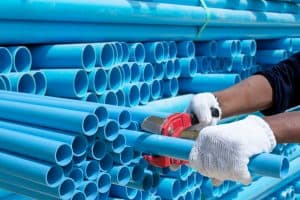 You want your family to have clean drinking water—it’s the least you can expect from the water in your home! But sometimes water treatment systems are necessary, such as water purifiers and filters.
You want your family to have clean drinking water—it’s the least you can expect from the water in your home! But sometimes water treatment systems are necessary, such as water purifiers and filters.
But what about the pipes in your house? We often hear questions from our customers about whether their pipes may be adding toxins to the water supply. Plastic pipes are becoming more common for both hot and cold water lines carrying fresh water, and we’re going to take a look at any safety concerns your home’s plumbing may have.
From Copper Pipes to Plastic
Since the 1970s, the standard piping material for home plumbing has been copper. Copper replaced galvanized steel, which tended to corrode and place lead into the water supply. Copper is safer since it is corrosion-resistant, although older copper installations (before 1990) might have lead-based soldering on them. Plastic piping started to become common around the same time as copper, principally PVC, CPVC, and PEX. All of these plastics are approved for use in freshwater lines and shouldn’t present health hazards for your household. They are marked as NSF-61, indicating they are compliant with government regulations for safe drinking water.
However, if you have recently had PVC and CPVC pipes installed in your house, you may have detected a slight plastic taste in the water. This is often what causes people to become concerned about the health quality of these pipes. There are some chemicals from the plastic production process that may enter the water to create this taste, but they aren’t harmful to drink and the plastic taste should subside after a few months. PEX piping, which is becoming more popular with plumbers each year, may also add a plastic taste, but this is less likely.
If a plastic taste persists, you may wish to ask about installing a water treatment system to remove the chemicals.
Exploring the Benefits of Black Plastic Water Piping
Black plastic water piping is a durable and versatile solution for plumbing needs. Its high-density polyethylene (HDPE) composition makes it resistant to corrosion and chemical damage, ensuring longevity. The black color provides UV resistance, which is ideal for outdoor installations.
This lightweight and flexible piping facilitates easy installation and reduces labor costs. Its smooth interior minimizes friction, improving water flow efficiency. Additionally, black plastic water piping is cost-effective compared to traditional materials like copper or PVC. Its widespread use in residential, commercial, and industrial applications underscores its reliability. When seeking efficient, long-lasting plumbing solutions, black plastic water piping emerges as a top choice.
Repiping for Plastic and Copper
So the short answer is: no, plastic pipes aren’t harmful to drinking water. In fact, they may be the best type of piping to have if you need to make upgrades to your home’s plumbing system. As we mentioned above, a home built pre-1970 may have galvanized steel—or even iron and lead—pipes in it, and not only can these put harmful chemicals into the water, but they are also prone to corrosion and decay. Your home may also have an older type of plastic pipe, polybutylene, which isn’t harmful to water quality but which breaks easily. We strongly recommend you have extensive repiping done to remove any of these types of pipe materials and have them replaced with copper, CPVC, and PEX.
You want a plumber in Chapel Hill, NC to look into your repiping needs. Our plumbers will examine your plumbing system and find out how much pipe replacement is necessary to bring your home up to date and keep its drinking water safe. We also work with water treatment systems to help ensure your family stays healthy.

